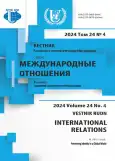The Epochal Crisis of Global Capitalism
- Authors: Robinson W.I.1
-
Affiliations:
- University of California
- Issue: Vol 24, No 4 (2024): Preserving Identity in a Global World
- Pages: 628-642
- Section: INTERNATIONAL ECONOMIC RELATIONS
- URL: https://journal-vniispk.ru/2313-0660/article/view/320675
- DOI: https://doi.org/10.22363/2313-0660-2024-24-4-628-642
- EDN: https://elibrary.ru/MLGVLO
- ID: 320675
Cite item
Abstract
The conflict in Ukraine escalated in 2022 and the West’s radical political, military and economic response to it was but the coup de grâce of a decadent post-World War II western-centric order. However, the escalation of geopolitical tensions around the world in the wake its violent crackup is symptomatic of something more fundamental: the epochal crisis of global capitalism. The crisis is multidimensional, and its varied dimensions are interconnected. It is a structural crisis of overaccumulation, a political crisis of state legitimacy and capitalist hegemony, a social crisis of global social reproduction, a geopolitical crisis of escalating international conflict, and an environmental crisis that threatens the collapse of the planetary ecosystem. Unlike earlier crises of world capitalism (four crises are traditionally distinguished), we are reaching the historical exhaustion of the conditions for capitalist renewal. Capitalist reactivation may be possible in the coming years through redistributive and regulatory policies and through the application of new digital technologies, but such reactivation could not in the long run resolve the underlying contradictions of a decadent global capitalism. The author concludes that modern society is very far from a revolution against global capitalism, due to the underdevelopment of subjective and organizational conditions. The paper applies a comprehensive approach to the processes and phenomena under consideration, using the principles of comparative data analysis and critical assessment of information. The relevance of the topic of research is due to both the increase in political instability in the world, and the noticeable growth of rivalry and confrontation in global economic processes.
About the authors
William I. Robinson
University of California
Author for correspondence.
Email: w.i.robinson1@gmail.com
PhD (Sociology), Distinguished Professor, Department of Sociology Santa Barbara, U.S.A
References
- Arrighi, G. (2010). The long twentieth century: Money, power and the origins of our times. London: Verso.
- Barnosky, A., Matzke, N., Tomiya, S., Wogan, G. O. U., Swartz, B., & et al. (2011). Has the Earth’s sixth mass extinction already arrived? Nature, 471, 51-57. https://doi.org/10.1038/nature09678
- Beaud, M. (2001). A history of capitalism: 1500-2000. New York: Monthly Review Press.
- Chew, S. C. (2006). The recurring dark ages: Ecological stress, climate changes, and system transformation. Lanham, Md.: AltaMira Press.
- Choonara, J. (2009). Unravelling capitalism: A guide to Marxist political economy. London: Bookmarks Publications.
- Cox, R. W. (1987). Production, power, and world order: Social forces in the making of history. New York, Guildford: Columbia University Press.
- Diamond, J. (2005). Collapse: How societies choose to fail or succeed. New York: Penguin Books.
- Foster, J. B. (2022). Capitalism in the Anthropocene: Ecological ruin or ecological revolution. New York: Monthly Review.
- Freeman, R. B. (2007). The great doubling: The challenge of the new global labor market. In J. Edwards, M. Crain & A. L. Kalleberg (Eds.), Ending poverty in America: How to restore the American dream (pp. 55-65). New York: The New Press.
- Geisler, C., & Currens, B. (2017). Impediments to inland resettlement under conditions of accelerated sea level rise. Land Use Policy, 66, 322-330. https://doi.org/10.1016/j.landusepol.2017.03.029
- Grossman, H. (1992). The law of accumulation and the breakdown of the capitalist system. London: Pluto Press. https://doi.org/10.2307/j.ctt18mbdkt
- Harvey, D. (2006). The limits to capital. London: Verso.
- Kotz, D. M., McDonough, T., & Reich, M. (Eds). (1994). Social structures of accumulation: The political economy of growth and crisis. Cambridge: Cambridge University Press. https://doi.org/10.1017/CBO9780511559501
- Luxemburg, R. (2015). The accumulation of capital. Eastford, CT: Martino Fine Books.
- Mandel, E. (1975). Late capitalism. London: Verso.
- Marx, K. (1967). Capital: A critique of political economy. Vol. I. New York: International Publishers.
- Marx, K. (1981). Capital: A critique of political economy. Vol. III. London: Penguin.
- Moore, J. W. (2015). Capitalism in the web of life: Ecology and the accumulation of capital. London: Verso.
- O’Connor, J. (1987). The meaning of crisis: A Theoretical Introduction. New York: Basil Blackwell.
- O’Connor, M. (Ed). (1994). Is capitalism sustainable? Political economy and the politics of ecology. New York: The Guilford Press.
- Phillips, P. (2018). Giants: The global power elite. New York: Seven Stories Press.
- Roberts, M. (2016). The long depression: How it happened, why it happened, and what happens next. Chicago: Haymarket Books.
- Robinson, W. I. (2004). A theory of global capitalism: Production, class, and state in a transnational world. Baltimore: Johns Hopkins University Press.
- Robinson, W. I. (2008). Latin America and global capitalism. Baltimore: Johns Hopkins University Press.
- Robinson, W. I. (2014). Global capitalism and the crisis of humanity. New York: Cambridge University Press. https://doi.org/10.1017/CBO9781107590250
- Robinson, W. I. (2020). The global police state. London: Pluto Press.
- Robinson, W. I. (2022). Global civil war: Capitalism post-pandemic. Oakland: PM Press.
- Schumpeter, J. A. (1950). Capitalism, socialism and democracy. London: Routledge.
- Sotelo Valencia, A. (2018). The Future of work: Super-exploitation and social precariousness in the 21st century. Leiden: Brill Academic Publishers. https://doi.org/10.1163/9789004300590
- Van der Pijl, K. (2022). States of emergency: Keeping the global population in check. Atlanta, GA: Clarity Press.
- Wallerstein, I. (1974). The modern world-system. Vol. I: Capitalist agriculture and the origins of the European world-economy in the sixteenth century. New York, London: Academic Press.
Supplementary files









